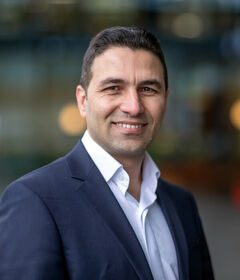TU/e spin-off among top ten most innovative startups
TU/e startup ATA Mute is one of the ten finalists in the Academic Startup Competition 2025. This competition offers promising academic startups a platform to break through, increase their impact, and scale up to the international market. The finalists will be officially honored on June 2 during a festive final evening at the TU/e campus.
The Academic Startup Competition (ASC) is a national program that selects and supports the most promising academic startups from Dutch universities and research institutes in their (inter)national growth. The program helps these startups translate scientific knowledge into concrete innovations that address major societal challenges such as health, sustainability, energy, and agriculture.
After three selection rounds, ten startups were chosen for the final, including ATA Mute, a spin-off from TU/e. In May, representatives of these young companies traveled to Silicon Valley for an exclusive program organized in collaboration with ScaleNL. During the festive final evening on June 2 — hosted this year at TU/e — the ten finalists will be officially honored.
A solution for noise pollution
ATA Mute develops technology to reduce noise in technical systems such as industrial combustion systems, heat pumps, wind turbines, and airplanes. With their innovative sound-absorbing materials, the company aims to reduce noise pollution and thereby contribute to quieter living and working environments.
Noise pollution is, after air pollution, the biggest environmental problem in Europe. It causes health complaints such as sleep disturbances and stress, and it also disrupts animal behavior. ATA Mute produces ultra-thin acoustic sheets, coatings, and panels that can reduce noise from various devices and machines by up to 90% - ranging from household appliances to airplanes and industrial installations.
Heat pumps
An important focus is on reducing the noise of heat pumps. As these sustainable systems are being installed more frequently, their low humming noise, especially at night, is becoming an increasing source of nuisance. With smart noise reduction technologies, ATA Mute helps meet stricter noise standards and improve residential comfort - an essential step to ensure sustainable technology is widely embraced.
There is also potential for improvement in the safe combustion of gases such as hydrogen and methane. Challenges like thermo-acoustic instability, air and noise pollution remain significant. ATA Mute develops technology that makes combustion quieter, safer, and cleaner. Their noise-damping components and measuring instruments result in less noise and better performance.
A quieter world
ATA Mute’s mission is ambitious: “a quieter world for everyone,” says co-founder and CEO Mohammad Kojourimanesh, who combines entrepreneurship with research at TU/e. “There are so many applications where we can reduce noise and truly make a difference.”
He regards their spot among the top ten Dutch startups as a significant recognition and a boost to the team’s confidence. “Honestly, I was confident we would make it to the final,” he says. “Our technology has a large market; there is great interest and demand from industry, but it is also valuable for people and society.” ATA Mute already collaborates with major companies such as Bosch, Intergas, and Zehnder. With the support and guidance they receive as finalists, the team hopes to conquer the international market soon as well.
From smart chips to useful fungi
Besides ATA Mute, nine other promising startups from various Dutch cities are finalists in the national competition. Tonight, they will all take the stage to present their innovative solutions, including IMChip from Groningen, which develops energy-efficient, brain-inspired chips for applications in robotics and healthcare. VirXcel, based in both Amsterdam and Utrecht, is working on an antiviral nasal spray to help prevent future pandemics. MycoFarming, based in Amsterdam, uses mycelium - a network of fungal threads - to purify harmful substances, such as nitrogen, from water. Through the competition, these startups receive support to put their innovations on the global map and bring them to market.



Discussion